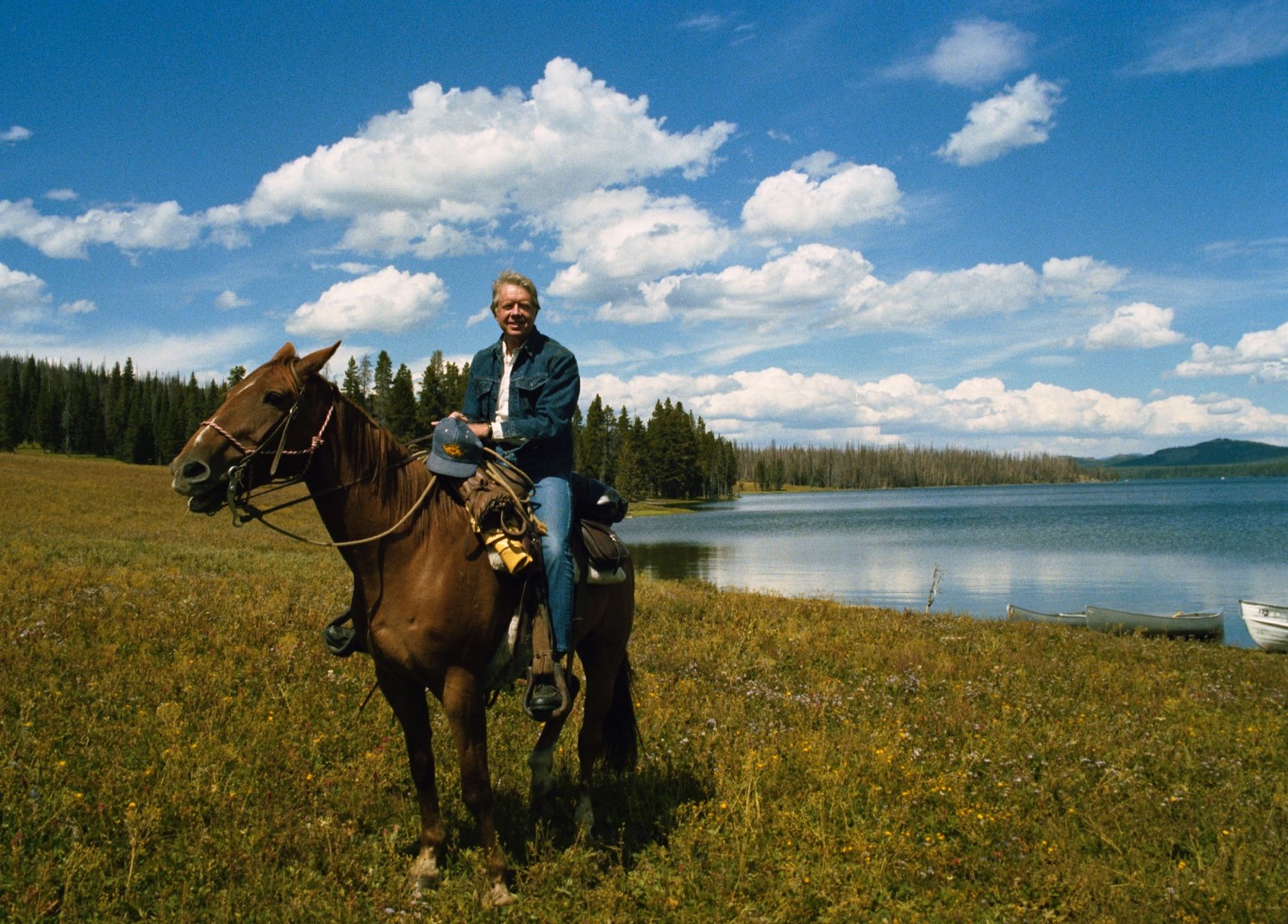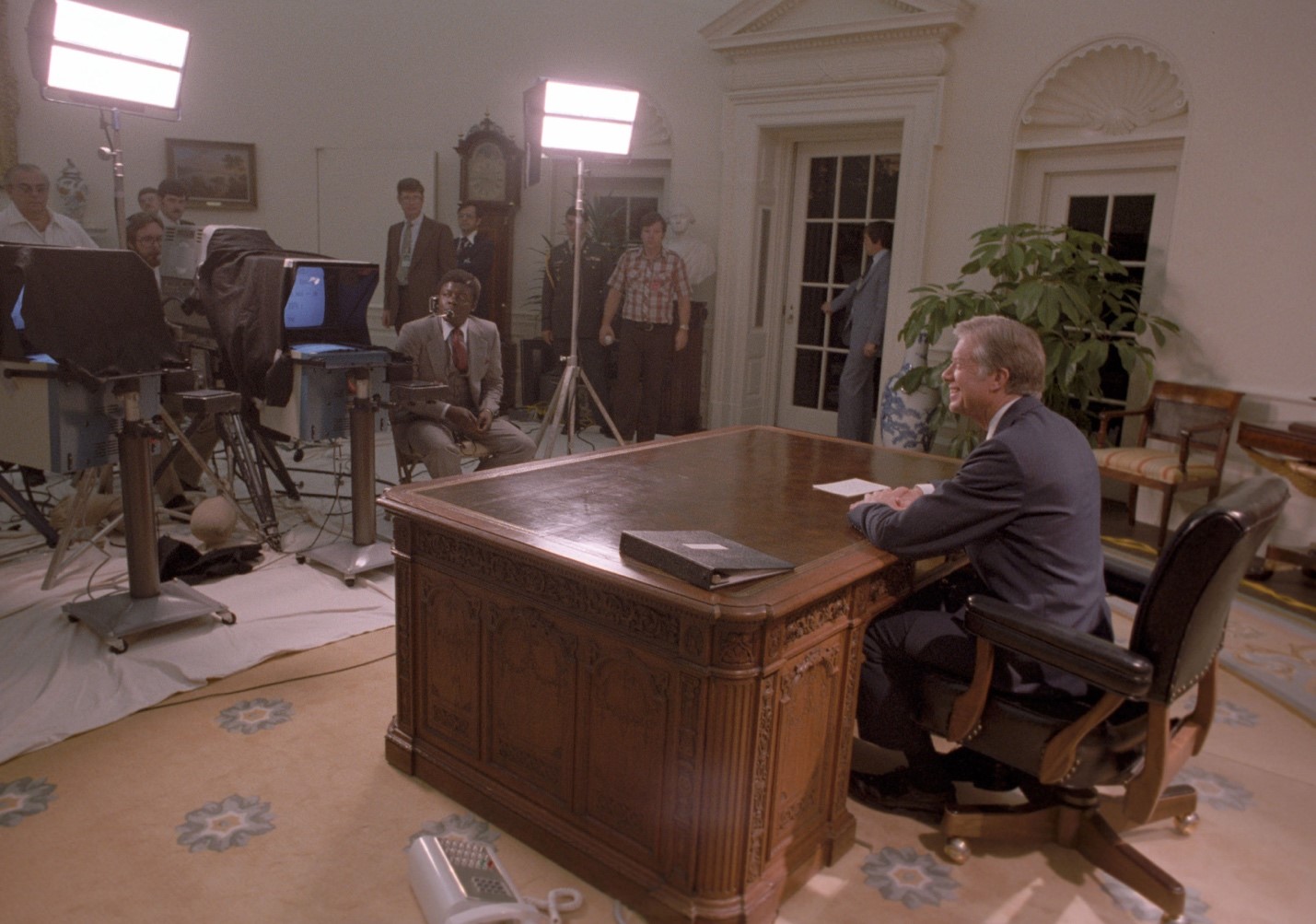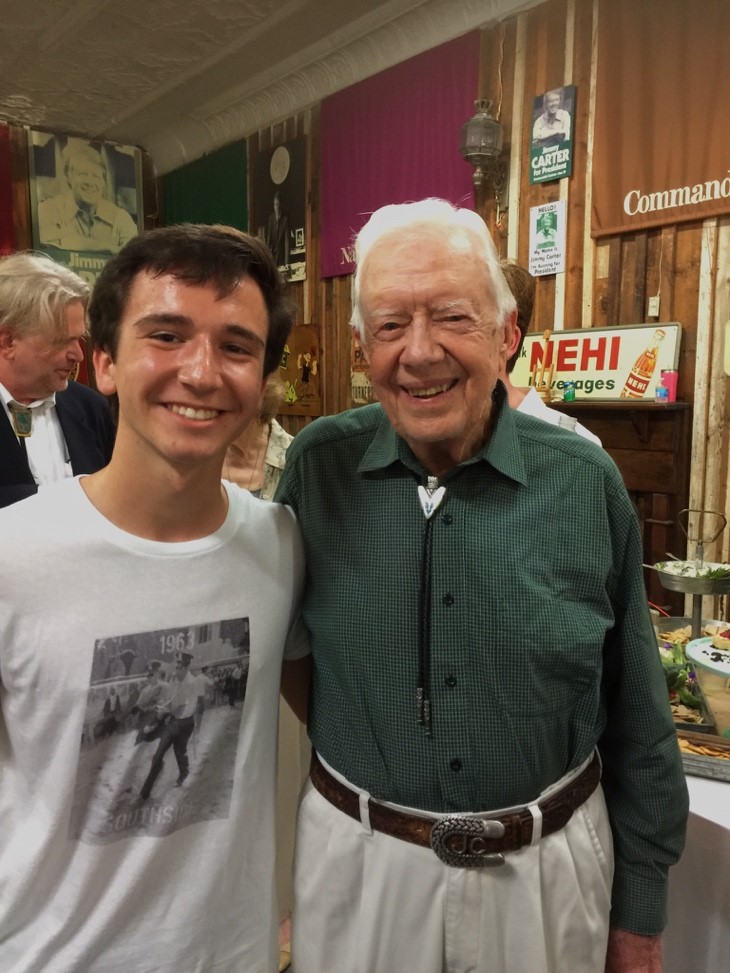17 President Carter’s Environmental Roots
Robert Riley

Howdy! My name is Robert. I found inspiration for my chapter about President Carter from my own personal interactions with him. I have met him several times and even attended his bible studies at his hometown church in Plains, Georgia. President Carter has been a great influence in my own personal and professional life. I knew that his faith was an important aspect of his life and I also knew about his great environmental track record, so I wanted to draw connections between the two…read more.


Former President Carter, the peanut farmer turned president, has a long and well-known record. He’s been everything from a farmer, navy man, state senator, then Governor of Georgia, President of the United States, Noble Peace Prize winner, and bible study teacher. What’s not as recognized as his noble peace prize winning post-presidency, or his political career, is his strong environmental policies. In his 4 years in the White House, President Carter did more for the environment than many presidents before and after him. He faced many challenges throughout his presidency, most notably the hostage crisis, and the energy crisis. These major challenges in his tenure have hogged much of the attention of his presidency, and people seem to forget his message of good environmental attitudes. The question is, where did his environmental attitudes come from?
I would argue that his attitudes and beliefs are rooted from his deep religious faith. President Carter is a well-known devout Christian, and a southern Baptist one. Whether you love or hate him, most would know that Jimmy Carter was a strong believer. How did he draw on those beliefs throughout his life, and especially when he was in the White House? He talks frequently in his books and bible study lessons of his admiration of Reinhold Niebuhr. Carter frequently quotes Niebuhr in his books and lessons, especially when mixing public office and religion. “In Reinhold Niebuhr on Politics, the theologian wrote, ‘To establish justice in a sinful world is the whole sad duty of the political order…’ Niebuhr’s obvious point is that the highest possible goal of a government or a society is to treat people fairly, to protect their safety, to guarantee their individual rights, to guard against discrimination, and to resolve disagreements peacefully. Most of us would agree that these goals are common to church and state” (Carter, 2018, pg.147). These principled of justice and service draw clear connections between his religious beliefs and political viewpoint. Carter avoided ever showing privilege to Christianity though, so it’s rare to find him using faith as reasoning for any policy. Although it’s not easy to find direct religious reasoning for environmental policy, it is possible to find the origins of his good environmental ethics by taking a closer look at his background and theological roots.
President Carter started his life in a small rural community in rural Georgia, where he still lives and teaches today. He was born in Archery, Georgia on October 1, 1924. It was humble beginnings, living on a farm and working around black laborers. “There was no running water, electricity, or insulation, and the only heat sources besides the kitchen stove were some open fireplaces” (Carter, 2015, pg.7). A strong work ethic was instilled in a young Jimmy Carter, and he continued to build on that throughout his entire life. There is a certain connection to nature that farming can have, even gardening. It teaches harmony between people and earth, as we use the soil to sustain our livelihoods. That background and harmony are just one of many origins in President Carter’s environmental roots. The question a farmer has to ask himself is, how can I be a good steward, because if they’re not they could hurt the land they so depend on.
Along with stewardship, growing up on a farm also built relationships with minority groups, like the black family Carter credits with much of his upbringing. He recalls in his autobiographic memoir, A Full Life (2015), a story involving his black playmates that shaped his anti-segregation stances for life. He describes walking with his playmates in public, and how they began acting strange when approaching a gated fence. They wouldn’t walk through the gate first, leading a young Carter to believe they had planted a trip wire along the bottom of the gateway. What was really happening, and Carter only realized this years later, was the black playmates of Carter knew that society deemed white people better than themselves. They had been instructed, or learned from society, to treat Carter better just because of his skin color. This later shaped Carter to be a staunch anti-segregationist, and he entered politics hoping to desegregate the public’s school system. Although Carter credits being anti-segregation as one of the main reasons for entering politics, he also had his faith to guide him. “We were having a one-week revival at our church, and the visiting pastor was staying with my mother. When I stopped by to tell her of my plans, the preacher asked, ‘Why in the world would you want to become involved in the dirty game of politics?’ After thinking for a few moments, I responded, ‘How would you like to be pastor of a church with 75,000 members?” (Carter, 2015, pg.81) –The 75,000 people being the members of his future state senate district. Carter viewed politics as a way to act on his faith, and reach more people than he would by sticking just to mission work.
Even though faith had much to do with him entering politics, he was careful not to use it too much. Carter believed staunchly in the separation of church and state, and believed the government should never show preference to a religious faith. President Carter would sometimes do surprise bible studies in Baptist churches in Washington D.C., but would never advertise them in advance. He would even go as far as ending the tradition of inviting famous pastors, like Billy Graham, to the White House for services. It took a southern Baptist to end Christian services in the White House, which is one of many things that drove Christians away from supporting Carter in his 1980 re-election bid.
Although he was strict about showing his faith, or pushing it on citizens, he would rely on it heavily throughout his political career and life. As Carter says, “I believe now, more than then, that Christians are called to plunge into the life of the world, and to inject the moral and ethical values of our faith into the process of governing. At the same time, there must be an absolute prohibition against granting any control by government over our religious freedoms”(Carter, 2018, pg.9). Drawing a connection from his faith and public office is somewhat difficult, only because he wouldn’t ever publicly use his faith as the reasoning behind a political position. Even though he has said before that he draws on that faith frequently, he never describes his faith as the source of a policy. It is possible however to find indirect connections in his messaging and policies, whether his conservation policies, or his somewhat anti-consumption messaging as president.
President Carter also believes that there isn’t conflict between the ideals of a democracy, such as the United States, and the teachings and beliefs of Jesus Christ, and he believes those teachings should guide and shape his public service. Those teachings are ones of helping the poor and destitute, fighting for equality, promoting and striving for peace, and last but not least, protecting the environment.
Many people would point to faith as the source of bad environmental policies for politicians. Although that may be true in some cases, it could just be powerful and influential people using faith as a way to reel in voters. This is clearly not the case for Carter, who said “I was born into a Christian family, nurtured as a Southern Baptist, and have been in weekly Bible
lessons all my life. At least one Sunday each year was devoted to protection of the environment, or stewardship of the earth. My father and the other farmers in the congregation would pay close attention to the pastors’ sermons, based on such texts as “The earth is the Lord’s, and the fullness thereof.” When humans were given domination over the land, water, fish, animals, and all of nature, the emphasis was on careful management and enhancement, not waste or degradation” (Carter, pg.16).
These teachings of good stewardship, along with promoting peace and equality, are present throughout Carter’s entire life and political career. Whether it was his anti-segregation politics in the Georgia state senate, or his progressive energy policies as president, Carter exemplified the Christian values and teachings he worshipped. In private prayer and in public policy, Carter’s views and actions were rooted in a deep religious faith, from the time he was a child dreaming to join the Navy, to now being a 95 year old bible study teacher in October 2019.
While serving as President of the United States, Carter faced one of the most difficult challenges any president has ever faced, the oil shortages of the late 70’s. As Carter himself describes in A Full Life, the long lines at gas stations and high prices were caused by OPEC and the Iran/Iraq war. This became one of the major factors in his low popularity, even though it was not a result of any of his actions. In response to this crisis, then President Carter tried to lift American spirits. He blamed the energy crisis on a much larger societal problem, one he called a “Crisis of Confidence.” In the address to the nation on July 15, 1979, he announced a progressive response to the oil shortage, “My announced goal was to derive at least 20% of our total energy from renewable sources by the year 2000” (Carter, 2015, pg.198). He didn’t only talk policy in his address, he pleaded with his nation, and at points even put the blame on them.

The crisis of confidence he was referring to was not just about America’s over dependence on oil, and our growing energy needs. He was claiming that Americans were addicted to consumption, and that true happiness or purpose cannot be obtained through it. This address has a lot of parallels to the writings of Reinhold Niebuhr. President Carter said, “In a nation that was proud of hard work, strong families, close-knit communities, and our faith in God, too many of us now tend to worship self-indulgence and consumption. Human identity is no longer defined by what one does, but by what one owns. But we’ve discovered that owning things and consuming things does not satisfy our longing for meaning. We’ve learned that piling up material goods cannot fill the emptiness of lives which have no confidence or purpose”(Carter, 1979). The speech was a call to action, one that would attempt to change a large societal problem, our addiction to consumption. Here Carter drew on his faith, more than ever before publicly, to rally the American people behind a message of conservation and unity.
The parallels from the address to the nation and his faith are evident. The questions he asks are the same that people ask of faith, what’s our purpose and how do we find it? Even though he’s not saying that you need faith to have purpose, he is saying that the loss of that, replaced by consumption, often does not lead to the answers of people’s true purpose. The speech was popular at first, but soon the Reagan campaign picked up the opposite perspective, asking why should a prosperous nation like the United States of America need to conserve and suffer, and that message by Reagan of consumption ended up winning in 1980. Carter relied on his faith to ask hard questions about our society, and where it could be improved. Instead of shifting the blame on something else, and finding a way to give easy answers to people, President Carter stated what he believed to be the hard truth of the situation. Reinhold Niebuhr has a similar message in Man as Sinner, in which he describes our natural tendency to act pride fully, which leads to sin.
In Reinhold Niebuhr’s Man as Sinner, Niebuhr gives an in depth look of the sin of pride, which is all pervasive in American society. As he describes, “Man’s pride and will-to-power disturb the harmony of creation. The Bible defines sin in both religious and moral terms. The religious dimension of sin is man’s rebellion against God, his effort to usurp the place of God. The moral and social dimension of sin is injustice. The ego which falsely makes itself the center of existence in its pride and will-to-power inevitably subordinates other life to its will and thus does injustice to other life” (Niebuhr, 1966, pg. 192). Niebuhr believed that the pride of men only results in sin, and it was a disturbance to the natural creation. Believing oneself to be better than another person is a direct contradiction to the teachings of Christ and the Bible as a whole. Pride inevitably leads to the belief that other people are inferior, or lesser than. The writings of Reinhold Niebuhr clearly had an impact on President Carter, who was obsessed with not seeming prideful. In the address to the nation, which was later dubbed the “malaise speech,” he drew upon the writings of Niebuhr. It can be said that the crisis of confidence Carter was talking about was the pride of his nation. Consumption had become a way to prove success, a source of pride.
Consuming to many meant you had been successful in life, and could afford to buy things you didn’t need, making you better than people with less than you. Knowing that it was not an easy thing to ask of the American people, President Carter tried to lead by example. He would even avoid claiming to be better than his political opponents while campaigning, and said he just believed he could do a good job and stay honest and truthful to the American people. According to Carter (2015, pg.122), he tried to take the frills away from the office. He would often carry his own luggage, he sold the presidential yacht, and would even wear sweaters in the Oval Office to encourage people to conserve on their energy consumption. He was trying to inspire the nation to be less consumeristic, something that is a common teaching in his faith. President Carter would later put solar panels on the roof of the White House, as a symbolic gesture of the future of renewable energy. Sadly though, the solar panels were taken down by the next administration.
While in office, and during his 1980 reelection campaign, President Carter received surprising criticism from religious groups. They were angry at his reluctance to reaffirm his faith, and his “Secular Politics.” President Carter tried his best to give women federal positions, where he most notably appointed Ruth Bader Ginsberg as a federal judge. He also didn’t lift the ban on prayer in public school, and refused to let government money go to religious private schools. These issues prompted prominent evangelical leader Jerry Falwell to create the “Moral Majority.” It was a conservative group of evangelicals, which rallied behind Carter’s opponent in 1980. They used Carter’s lack of action on overturning Roe v. Wade, the controversial abortion ruling, as a rallying call to evangelicals throughout the country. Evangelicals have ever since been strong supporters of the Republican Party (Carter, 2015, pg. 184).
President Carter managed to make huge environmental progress, from addressing our energy crisis, advocating for renewable energy, protecting natural lands, protecting waterways, and more. Even before he was president of the United States he managed to protect natural waterways from damming. He has always been an avid outdoorsman, who started fishing in local streams as a child. Later in life, while Governor of Georgia, he would frequently take treacherous canoe trips down the Chattooga river. Carter’s respect for rivers and streams are evident in his policy. Then Governor Carter acted to protect the Chattanooga river by declaring it wild and scenic, protecting 57 miles of the river from development. He would go on protecting wild rivers and streams when he became the president, eventually vetoing 16 different dam projects throughout the country (Hall, 2017).
One of the most significant environmental bills President Carter passed was the Alaska National Interest Lands Conservation Act, which set aside 56 million acres as national parks and protected over 25 rivers from oil and gas development (Carter, 2015, pg.170). This more than doubled the size of America’s national park system, making Carter’s contribution very significant. Even though the actions were not popular in Alaska, he took the side of environmental groups and fought against the massive oil and gas lobbying that wanted the land for development. Allowing those powerful lobbies to drill would have made life easier for Carter, especially since the nation was in the middle of an energy crisis. If the lands were opened to drilling, although it would’ve caused significant harm to the wilderness, it would have greatly increased America’s energy production. As the President describes, “My efforts were extremely unpopular in Alaska, and I had to have extra security on my visits. I remember that there was a state fair where people threw baseballs at two targets to plunge a clown into a tank of water. My face was on one target and Iran’s Ayatollah Khomeini’s on the other, and few people threw at the Ayatollah’s” (Carter, 2015, pg. 170). President Carter knew though of the harm it would cause, and took on the harsh political battle of protecting the land, and he eventually won.
President Carter’s legislative success did not stop at protecting waterways or Alaska. He had major success in pushing through environmental regulation bills, such as amendments strengthening the clean water and air acts, the Surface Mining Reclamation Act, the Federal Mine Safety and Health Act, the Nuclear Non-Proliferation Act, the National Energy Act, the Federal Environmental Pesticide Control Act, and the reauthorization of the Endangered Species Act(Peter’s). These bills, although they don’t get much attention, added much needed protection to the environment. A great example of this would be the Surface Mining Reclamation Act, which was the first environmental regulation regarding coal mining. Carter’s most ambitious environmental policy proposal was his National Energy Act.
The National Energy Act was President Carter’s legislative response to the energy crisis that caused long lines and high gas prices. It had extremely progressive solutions considering the time of its passing. As stated above, it called for 20% renewable energy production by the year 2000. Sadly that goal hasn’t even been met today in 2019. The United States only gets about 11% of its energy from renewable sources, according to the Department of Energy. President Carter even tried to put solar panels on the White House roof as a symbolic gesture of where we should head in our consumption and demand. Like most of the energy bill, the solar panels were scrapped after his presidency. It’s hard to tell if the policy would have been truly enacted if he were elected another four years, but at the very least the messaging from the Oval Office would have been one of support for our common home.
President Carter with the Whitehouse Solar Panels Public Domain Source: National Archives
More recently in his post-presidency, now former President Carter continues to advocate for renewable energy. In his hometown of Plains, Georgia, Carter leased his farmland, 10 acres, to be used as a solar farm. The farm will cover about half of the town’s total energy consumption (Reedy, 2017). It just goes to show where his priorities still are. Considering he could have used his post presidency as a way to cash in, he instead uses it as a way to serve his country. Unlike other former presidents, who give multi-million dollar speeches to banks, Carter continues his work as a global humanitarian. He founded the Carter Center in 1980, and has devoted most of his post-presidency to it. The Carter Center works to bring safe water to underdeveloped nations, works to eradicate diseases, and monitors elections in developing democracies. When asked about why he didn’t pursue a life where he could have made more money, he said, “It never was my ambition to be rich” (Berger, 2019). He has stayed true to the humble character he exemplified while president.
Even though he was careful about directly relating policy and his faith, it is evident that his upbringing and faith had a massive impact on his public policy. The deep south Baptist stayed true to Carter’s roots. Starting as a farmer, living a modest life, surrounded by people of color, he learned a deep connection to the natural world. After witnessing firsthand the discrimination put on his playmates and friends, he eventually got involved in politics to stand up for the civil rights movement. While Governor and President he constantly drew on his faith, but was careful to show any preference by honoring the separation of church and state. When faced with the energy crisis, he not only laid out a progressive renewable energy bill, but tried to change the culture of the United States. The growing materialism and consumerism of the nation contradicted his faith, and he knew it was the wrong path for the nation. Even though many Americans didn’t listen, and much of his efforts were swept under the rug by a new administration, he still managed to make significant environmental progress. With the help of his faith, President Carter created a legacy, one of service to his nation and great environmental virtues.

References
Berger, S. (2019, April 08). Former President Jimmy Carter lives in a $167,000 house and shops at the Dollar General. Retrieved April 15, 2019, from https://www.cnbc.com/2018/08/22/jimmy-carter-lives-in-an-inexpensive-house.html
Carter, J. (2018). Faith: A journey for all. Waterville: Thorndike Press.
Carter, J. (2015). A Full Life: Reflections at Ninety. Simon & Schuster.
Carter, J. (2005). Our Endangered Values. Simon & Schuster
Department of Energy. (2018, May 16). Energy Consumption and Production. Retrieved April 15, 2019, from https://www.eia.gov/energyexplained/?page=us_energy_home
Hall, T. (2017, April 27). The Wild President: Jimmy Carter and the Chattooga River. Retrieved from https://www.blueridgeoutdoors.com/go-outside/wild-president-jimmy-carter-chattooga-river/amp/
“July 15, 1979: ‘Crisis of Confidence’ Speech.” Miller Center, University of Virginia , 3 May 2017, https://millercenter.org/the-presidency/presidential-speeches/july-15-1979-crisis-confidence-speech
Niebuhr, R. (1964). Man as Sinner. Charles Scribner’s Sons. Retrieved April 1, 2019.
Peters, G., & Woolley, J. T. (1979, August 02). Environmental Priorities and Programs Message to the Congress. Retrieved April 14, 2019, from https://www.presidency.ucsb.edu/documents/environmental-priorities-and-programs-message-the-congress
Reedy, C. (2017, July 11). Former President Jimmy Carter Just Made a Solar Farm to Power Half His City. Retrieved April 15, 2019, from https://futurism.com/former-president-jimmy-carter-just-made-a-solar-farm-to-power-half-his-city
